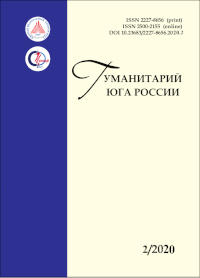От «онлайнизации» высшей школы к онлайн-образованию
Научная статья
Для цитирования
Лубский А. В., Ковалев В. В. От «онлайнизации» высшей школы к онлайн-образованию // Гуманитарий Юга России. 2020. Том 9. № 2. С. 33-50. DOI: https://doi.org/10.18522/2227-8656.2020.2.2
Аннотация
В статье рассматриваются преимущества и недостатки онлайн-обучения, выявляются технические, технологические, ментальные и методические проблемы организации учебного процесса в условиях вынужденного перехода высшей школы от контактно-аудиторного обучения к образованию в онлайн-формате. Делается вывод о целесообразности внедрения гибридных форм организации образовательного процесса в высшей школе, сочетающих преимущества как контактно-аудиторного, так и онлайн-образования. При этом обращается внимание на то, что принципы онлайн-образования требуют переосмысления методик преподавания учебных дисциплин, сложившихся в контактно-аудиторной среде. Основой разработки методик преподавания учебных дисциплин в рамках онлайн-образования может стать познавательно-развивающая парадигма образования, базирующаяся на проблемно-диалоговом способе организации образовательного пространства с использованием современных образовательных и информационно-коммуникационных технологий.
Ключевые слова:
онлайн-обучение; синхронное онлайн-обучение; асинхронное онлайн-обучение; дистанционное обучение; электронное обучение; онлайн-образование; познава-тельно-развивающая парадигма образова-ния; проблемно-диалоговый способ орга-низации образовательного пространства
Литература
1. Виды и методы онлайн-обучения. Режим доступа: https:// myownconference.ru/blog/index.php/vidy-online-obucheniya/.
2. Виды онлайн-обучения (лекции, семинары, видеокурсы, онлайн-курсы, тренинги) – в чем различие? Режим доступа: http://www.electrolibrary.info/information/78-vidy-onlayn-obucheniya-v-chem-razlichie. html.
3. Волков Ю.Г., Лубский А.В., Верещагина А.В. Самостоятельная работа студентов : учеб. пособие. М. : КНОРУС, 2016.
4. Герасимов Г.И., Лубский А.В. Диалог о парадигмальном подходе в образовании // Гуманитарий Юга России. 2014. № 1. С. 119–137.
5. Гражданственность в молодежной среде в России, Германии и Франции / А.В. Лубский, В.О. Вагина, Е.В. Громакова, В.П. Иванова, А.В. Ковалева, Д.А. Мамина; отв. ред. А.В. Лубский. Ростов н/Д. : Фонд науки и образования, 2020.
6. Зинченко В.П. Образование. Мышление. Культура. // Новое педагогическое мышление / под ред. В. Петровского. М. : Педагогика, 1989. С. 90–102.
7. Ицхоки О. Профессор Принстона и UCLA. Вернутся ли в Россию 90-е? Режим доступа: https:// www.youtube.com/watch? v=HHm0asBiXIE.
8. Клиповое мышление: чем отличаются «люди экрана» от «людей книги»? Режим доступа: https://monocler.ru/klipovoe-myishlenie/.
9. Лубский А.В. Методологические проблемы использования ИКТ в образовательном пространстве высшей школы // Информатика и образование. 2007. № 6. С. 10–14.
10. Онлайн-обучение – предпосылки к революции в традиционном понимании образования. Режим доступа: https:// netology.ru/blog/education-revolution.
11. Романова Н.Л. Онлайн-курсы как инновационная форма дистанционного обучения // Педагогика высшей школы. 2018. № 2 (12). С. 5–8.
12. Силаева В.Л. Об использовании понятия «виртуальный» // Социологические исследования. 2010. № 8. С. 19–25.
13. Фомина А.С. Онлайн-обучение в высшем учебном заведении: методики, контент, технологии // Общество: социология, психология, педагогика. 2016. № 1. С. 101–106.
14. Чем современные подростки отличаются от советских. Режим доступа: https:// proforientator.ru/publications/articles/chem-sovremennye-podrostki-otlichayutsya-ot-sovetskikh.html.
15. Шалыгина Н.В. Игреки и центениалы: новая ментальность российской молодежи // Власть. 2017. Т. 25, № 1. C. 164–167.
16. Энциклопедия форматов онлайн-обучения. Режим доступа: https:// www. activelearn.ru/libformats.
17. 9 любопытных отличий современного подростка от советского. Режим доступа: https://mel.fm/podrostki/1385209-new_ generation.
18. 125 online learning innovations. June 2015. Р. 14–19. Режим доступа: https:// teachonline.ca/sites/default/files/tools-trends/downloads/pockets_of_innovation_themes-june_2015.pdf.
19. COVID-19 is reviving the need to explore online teaching and learning opportunities. Режим доступа: https:// epale.ec.europa. eu/en/blog/covid-19-reviving-need-explore-online-teaching-and-learning-opportunities.
20. Effective teaching online. Режим доступа: https:// www.insidehighered.com/ digital-learning/article/2017/07/12/7-guidelines-effective-teaching-online.
21. Four-step strategy to create active learning in any learning space - online, F2F or blended. Режим доступа: https:// online learninginsights.wordpress.com/tag/active-learning-strategies-for-online/.
22. The future of online learning. Режим доступа: https:// www.onlinestudies.com/ article/the-future-of-online-learning/.
23. What’s the difference between online learning and distance learning? Режим доступа: https:// www.aeseducation.com/blog/ online-learning-vs-distance-learning.
2. Виды онлайн-обучения (лекции, семинары, видеокурсы, онлайн-курсы, тренинги) – в чем различие? Режим доступа: http://www.electrolibrary.info/information/78-vidy-onlayn-obucheniya-v-chem-razlichie. html.
3. Волков Ю.Г., Лубский А.В., Верещагина А.В. Самостоятельная работа студентов : учеб. пособие. М. : КНОРУС, 2016.
4. Герасимов Г.И., Лубский А.В. Диалог о парадигмальном подходе в образовании // Гуманитарий Юга России. 2014. № 1. С. 119–137.
5. Гражданственность в молодежной среде в России, Германии и Франции / А.В. Лубский, В.О. Вагина, Е.В. Громакова, В.П. Иванова, А.В. Ковалева, Д.А. Мамина; отв. ред. А.В. Лубский. Ростов н/Д. : Фонд науки и образования, 2020.
6. Зинченко В.П. Образование. Мышление. Культура. // Новое педагогическое мышление / под ред. В. Петровского. М. : Педагогика, 1989. С. 90–102.
7. Ицхоки О. Профессор Принстона и UCLA. Вернутся ли в Россию 90-е? Режим доступа: https:// www.youtube.com/watch? v=HHm0asBiXIE.
8. Клиповое мышление: чем отличаются «люди экрана» от «людей книги»? Режим доступа: https://monocler.ru/klipovoe-myishlenie/.
9. Лубский А.В. Методологические проблемы использования ИКТ в образовательном пространстве высшей школы // Информатика и образование. 2007. № 6. С. 10–14.
10. Онлайн-обучение – предпосылки к революции в традиционном понимании образования. Режим доступа: https:// netology.ru/blog/education-revolution.
11. Романова Н.Л. Онлайн-курсы как инновационная форма дистанционного обучения // Педагогика высшей школы. 2018. № 2 (12). С. 5–8.
12. Силаева В.Л. Об использовании понятия «виртуальный» // Социологические исследования. 2010. № 8. С. 19–25.
13. Фомина А.С. Онлайн-обучение в высшем учебном заведении: методики, контент, технологии // Общество: социология, психология, педагогика. 2016. № 1. С. 101–106.
14. Чем современные подростки отличаются от советских. Режим доступа: https:// proforientator.ru/publications/articles/chem-sovremennye-podrostki-otlichayutsya-ot-sovetskikh.html.
15. Шалыгина Н.В. Игреки и центениалы: новая ментальность российской молодежи // Власть. 2017. Т. 25, № 1. C. 164–167.
16. Энциклопедия форматов онлайн-обучения. Режим доступа: https:// www. activelearn.ru/libformats.
17. 9 любопытных отличий современного подростка от советского. Режим доступа: https://mel.fm/podrostki/1385209-new_ generation.
18. 125 online learning innovations. June 2015. Р. 14–19. Режим доступа: https:// teachonline.ca/sites/default/files/tools-trends/downloads/pockets_of_innovation_themes-june_2015.pdf.
19. COVID-19 is reviving the need to explore online teaching and learning opportunities. Режим доступа: https:// epale.ec.europa. eu/en/blog/covid-19-reviving-need-explore-online-teaching-and-learning-opportunities.
20. Effective teaching online. Режим доступа: https:// www.insidehighered.com/ digital-learning/article/2017/07/12/7-guidelines-effective-teaching-online.
21. Four-step strategy to create active learning in any learning space - online, F2F or blended. Режим доступа: https:// online learninginsights.wordpress.com/tag/active-learning-strategies-for-online/.
22. The future of online learning. Режим доступа: https:// www.onlinestudies.com/ article/the-future-of-online-learning/.
23. What’s the difference between online learning and distance learning? Режим доступа: https:// www.aeseducation.com/blog/ online-learning-vs-distance-learning.
Статья
Опубликована: 27.05.2020
Форматы цитирования
Другие форматы цитирования:
APA
Лубский, А. В., & Ковалев, В. В. (2020). От «онлайнизации» высшей школы к онлайн-образованию. Гуманитарий Юга России, 9(2), 33-50. https://doi.org/10.18522/2227-8656.2020.2.2
Раздел
СОВРЕМЕННОЕ РОССИЙСКОЕ ОБЩЕСТВО В УСЛОВИЯХ ПАНДЕМИИ






